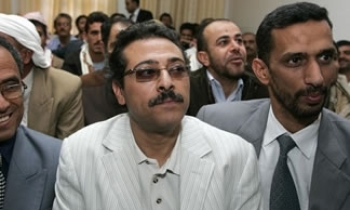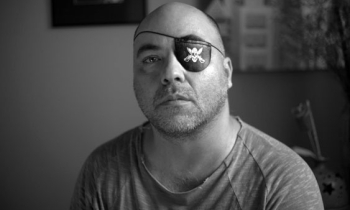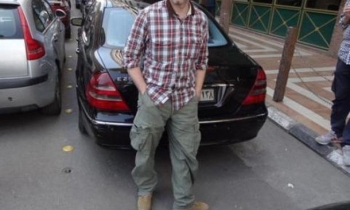NEW DELHI, Jul 30 (IPS) - Maldives, in the Indian Ocean, is known as an island paradise for those who want to get away from it all. But, not so well known is the fact that it is a hell for journalists and dissidents who dare criticise the 28-year-old regime of President Maumoon Abdul Gayoom.
Gayoom is currently under severe criticism from international media groups for denying his country's 300,000-odd citizens the fundamental right to free speech and expression.
Last week, an International Press Freedom Mission, comprising five non-government organizations (NGOs), released a report urging the Gayoom government to end the "arbitrary arrest, harassment and intimidation of journalists and dissidents". The mission included representatives of media watchdog bodies like the International Federation of Journalists, International Media Support, Reporters Without Borders and the South Asia Press Commission.
The release of the mission's report nearly coincided with Maldivian viewers being suddenly denied access to the TV news channel of the British Broadcasting Corporation (BBC). While it was officially claimed that BBC was taken off the air following a contractual dispute between two cable operators, Medianet and B-Net, many suspect an attempt at content control.
Little information escapes the chain of more than 1,000 coral islands, that constitute this South Asian country but journalists and activists who travel out carry with them chilling tales of repression and custodial brutality.
"I appeal to the international community to not look at the Maldives as a haven for tourists, as a country of atolls, the blue ocean, silver sands and coconut palms swaying in the tropical breeze and instead pay attention to the brutal way in which citizens are being denied their fundamental rights and the way the media is gagged," Aminath Najeeb, rights activist and editor of the ‘Minivan' (freedom) newspaper, told IPS on the sidelines of a gathering of the South Asia Free Media Association (SAFMA) in Karachi, in June.
Abdullah Saeed Fahala, a journalist reporting for Minivan, the only opposition daily published out of Male, the capital of the Maldives, was recently arrested on charges of trafficking in heroin. The police claimed packets of the drug were found on his person. But Najeeb, who was detained in prison for 74 days in 2004, claims the charges are false.
"The allegations against Fahala have been trumped up because he was writing against the Gayoom government," Najeeb said. She told IPS that her colleague was denied the services of his lawyer and denied the opportunity to testify under oath against allegations levelled against him by the police.
According to Najeeb her newspaper with a circulation of approximately 3,700 copies in Male -- where 80,000 out of the 300,000 citizens of the Maldives reside -- was allowed to begin publishing in 2005 because of international support given to the opposition Maldivian Democratic Party that has been exerting pressure on the Gayoom regime.
This party was established in exile in neighbouring Sri Lanka in November 2003. In the previous month, after the body of a 19-year-old youth bearing torture marks was discovered, there had been civil unrest in Male and two prison inmates had been killed in police firing. Out of the six reporters of Minivan, three have been sentenced, detained or charged, says Najeeb. She claims two writers for the newspaper were offered bribes which they refused -- both are currently serving sentences.
In an interview with IPS, Imtiaz Alam, secretary general of SAFMA, an associate body of the South Asian Association for Regional Cooperation (SAARC) -- comprising India, Pakistan, Sri Lanka, Bangladesh, Nepal, Bhutan and the Maldives -- acknowledged that among the seven SAARC countries, the Maldives has "probably the worst track record as far as upholding media freedom is concerned".
The report of the International Press Freedom Mission states that Maldivian journalists covering political and social events and demonstrations, as well as demonstrators themselves, have been victims of the excessive use of force by security personnel. It also cites cases of journalists receiving death threats and other forms of intimidation.
The report denounced the "continued detention and house arrest of a number of journalists" and contended that the "charges against five journalists and editors working for Minivanàwould appear to constitute a concerted effort by the authorities to target this publication". It condemned the abuse of Interpol procedures against exiled journalists and the overseas Maldivian media, the blocking of the websites of ‘Dhivehi Observer' and ‘Maldives Culture' and the jamming of the shortwave frequency of Minivan Radio.
In response to government allegations against local journalists that they have not acted in a responsible manner, Minivan has released a code of ethics for its staffers that has been drafted with assistance from the International Federation of Journalists and the Commonwealth Press Union. The code includes "a firm commitment to investigative journalism in the public interest" while emphasizing the need for "balanced, sensitive and responsible news coverage". It also issues instructions against reportage that may incite violence.
On Jun. 3, journalists in Male organised a function to mark World Press Freedom Day. Traditional rice pudding was served and speeches were delivered about suppression of the right to free expression in the country. The police responded by disrupting the function and confiscating equipment -- in the presence of representatives of international media watchdog organizations. The following day, a committee was set up to draft a proposal to form a Maldives Media Association.
Under pressure from journalists at home and abroad, Gayoom has promised a "roadmap to reform" which includes a "bill on media freedom". The journalistic community in Male insists that the bill should be brought in through a legislative process, rather than by Presidential decree, in the interests of democracy. Media watchdogs have said the clauses were too vague and could be easily abused by the authorities. On Jul. 27, when the Minivan celebrated its first anniversary, its news editor Nazim Sattar was quoted in the paper saying: "They say a baby is most vulnerable during its first year of life. Well, we've got through that and, believe me, we've had to grow up fast. The government has tried everything to silence us, but we're still here and we're getting stronger."
Najeeb told IPS that it was extremely important to appeal to the international community because such pressure could influence the Gayoom government. After all, other than fish, Maldives imports almost everything that is consumed in the country.









